- Bermuda vs St Augustine Grass: Which Is Right For You? - March 15, 2021
- How to Fix Yellow Grass: Top Tricks and Ideas You Must Know - March 14, 2021
- Best Soil Test Kits – 7 Top Picks to Get the Job Done - December 16, 2020
Soil test kits give you an idea of the levels of nitrogen, phosphorous, and potassium in your soil. As such, you will know if you need to fertilize your soil with any of these nutrients so that your plants grow healthy.
Soil test kits can also measure your soil’s acidity. It can tell you if the soil has a balanced pH of around 6.0 to 6.8, which most plants prefer. If you don’t have slightly acidic soil, you can still amend it to make it ideal for your plants.
What are the best soil test kits there are?
- 1. Luster Leaf Products Luster Leaf 1665 Professional Soil Kit
- 2. Luster Leaf 1605 Digital Soil Test Kit
- 3. Soil Savvy – Soil Test Kit
- 4. AquaChek AccuGrow 571802
- 5. Atree Soil pH Meter
- 6. Whitetail Institute Laboratory Soil Test Kit
- 7. FUNSW Soil pH Test Kit
Besides detailing how each of these kits can help you grow healthier plants, we’d also look at the accuracy of test kits in general and answer some of your questions. So read on and learn more about soil test kits and which ones you should buy.
1. Luster Leaf Products Luster Leaf 1665 Professional Soil Kit
The Luster Leaf Products Luster Leaf 1665 Professional Soil Kit allows you to test your soil for nitrogen, potassium, and phosphorus. It can also test your soil’s pH.
You might think that it’s overwhelming to keep track of which bottle should be used to test for different nutrients, but this kit comes with very detailed instructions that are easy to follow.
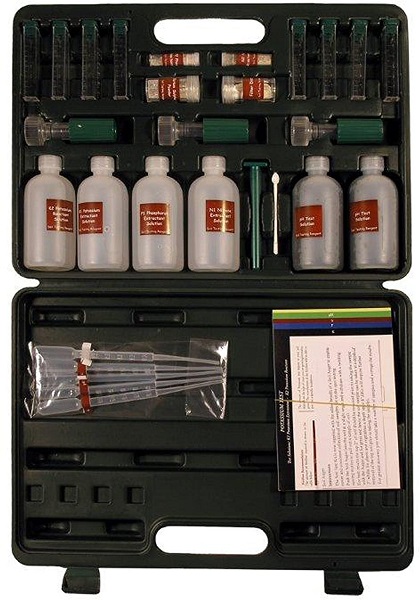
With enough material for 200 tests, you can keep the chemicals and materials inside a plastic case, so everything is safe from environmental and physical damage.
What’s more, it includes some tips on how to change the conditions of your soil, so you will know what to do once you’re done with the tests.
Each kit costs close to $100 but considering that it’s for 200 different tests, it’s like paying less than 50 cents for each one. H
owever, you should know that there are some complaints about how the number of tests that the manufacturer claims you can do is overblown.
Pros
- The tests are entirely accurate
- The results are quite simple: depleted, deficient, adequate, sufficient, or surplus for the nutrients and a specific range for the pH
Cons
- Accuracy largely depends on how well you follow the instructions
- It may take a lot of your time to do the tests as you will need to wait for the soil to be thoroughly dry and then pulverize it into fine dust before you can extract the water/soil solution required for the tests
- Some reviewers complaining about the accuracy of the tests
- The actual kits do not have enough materials to do the number of tests claimed on the package
- It doesn’t test for micronutrients
2. Luster Leaf 1605 Digital Soil Test Kit
The Luster Leaf 1605 Digital Soil Test Kit is for those who like to test their soil pH and nutrients without going through a lot of hassle.
You just need to mix the soil with the right amount of water, put the solution inside the tester, and then push a button to see the results.
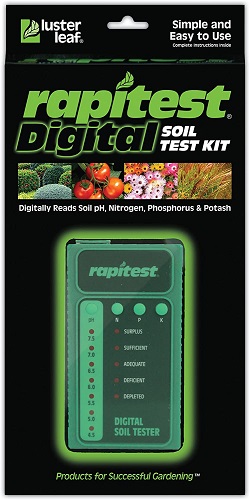
This kit also has a list of more than 450 plants and their preferred pH levels, as well as information on how to fertilize your soil, depending on the results you get when testing for potassium, nitrogen, and phosphorus.
This kit allows you to perform 25 tests: five for the three primary nutrients and 10 for soil pH. Each test will require you to use the appropriate capsule.
Pros
- The chemicals are in capsules, so you’re guaranteed to get enough materials for the claimed number of tests
- Chemicals do not go bad due to air exposure because they are encapsulated
- Accurate, with some reviewers saying that the results are similar to laboratory results
- Digital readings take out the guesswork of analog or color comparison kits
Cons
- A few reviewers claim that the pH and nitrogen tests are not reliable
- Limited pH range is a problem as it cannot tell you how alkaline your soil is
3. Soil Savvy – Soil Test Kit
The Soil Savvy – Soil Test Kit is quite different from other products on this list that allow you to do the tests on your own and get the results in a matter of seconds or minutes.
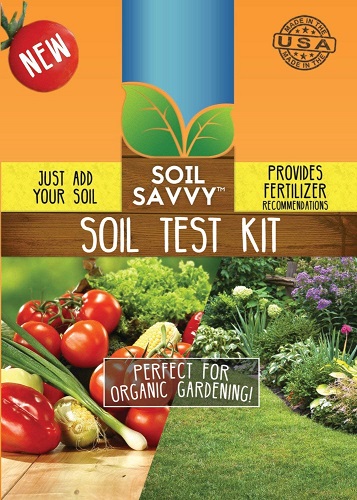
This kit only includes the tools you need to collect soil samples from your yard, a laboratory submission form, and a pre-paid envelope. You will need to wait anywhere from seven to 10 business days to get the results.
The Soil Savvy kit is probably the closest thing that you can get to laboratory testing. However, we include this here because the product makes it easier for you to test your soil, and it offers testing for micronutrients as well, including:
- Iron
- Zinc
- Copper
- Boron
- Aluminum
- Calcium
- Magnesium
- Sulfur
- Sodium
- Manganese
What’s more, the results are presented to you in graphical form, making it easier for you to see which nutrients are lacking, as well as the actual level of these nutrients in parts per million.
Problems with the Company
While the product and the testing have no complaints, the company had some problems when COVID-19 forced universities to institute lockdowns.
According to the Better Business Bureau, the problem is that the company behind Soil Savvy does not seem to have an emergency or backup plans in place.
During the early part of 2020, the company was plagued by various problems that prevented them from performing the tests that were sent to them.
From having technical issues to not being able to access their laboratories, the company simply stopped testing. They did not inform customers of the possible delays and still held on to their guarantee that results will be out in seven to 10 business days.
However, these problems seem to have been corrected now. For this reason, we include this product in our recommendations.
Pros
- Very accurate results using technology used by agricultural producers, landscapers, and other professionals
- One of the few kits to test micronutrients
- Easy to use
- With fertilizer recommendations to make it easier for you to improve the soil
- Easy to read results
- Easy to follow instructions
Cons
- Customer service could be better
- The company seems unable to address issues that can prevent them from doing the testings
4. AquaChek AccuGrow 571802
The AquaChek AccuGrow 571802 tests nitrogen, phosphorus, and potassium, as well as your soil’s pH.
One of the product’s most significant selling points is how easy it is to use. You will need to ix your soil with distilled water and then dip the strips into the solution.
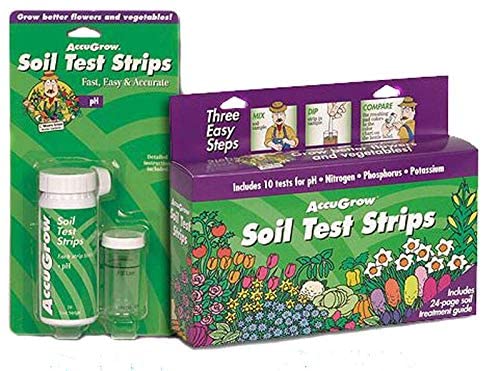
The results are ready in just minutes. It includes a soil treatment guide that tells you what to do based on the testing kit results.
The downside to using the AquaChek AccuGrow 571802 is that it is not really precise. You are given a range to work with. But sometimes that’s all you need, such as when you’re just monitoring your soil’s pH and nutrient levels.
Pros
- It gives you an idea of the nutrients in your soil
- Easy to use
- Quick results
Cons
- It can be expensive at only 10 strips per kit
- It gives you only a gross estimate, which may require you to buy a more specific or thorough test
5. Atree Soil pH Meter
Sometimes, you don’t really need to know about the nutrients in the soil. However, if you are concerned about when to water your plants, how much sunlight it’s getting, and the acidity of the ground it is planted in, you can get something like the Atree Soil pH Meter.

This soil tester is a breeze to use. You just have to insert about two-thirds of the probe into the soil, ensuring that you have around four to six inches () of soil to test. The meter will tell you:
- The level of moisture in the soil
- The intensity of sunlight
- The soil’s pH levels
This analog meter is very accurate, and it doesn’t need batteries to work. Plus, you can get the readings in only 10 minutes.
Pros
- One device measures three conditions: moisture, light intensity, and pH level
- Very easy to use
- Small enough to use in pots
Cons
- Does not measure nutrient levels in the soil
- It does not work for plants that are placed in water
- Reviewers complain that soil pH test may be inaccurate
6. Whitetail Institute Laboratory Soil Test Kit
The Whitetail Institute Laboratory Soil Test Kit is another commercial testing kit like Soil Savvy.
However, while this one includes a USPS envelope, you will still have to pay for the cost of shipping your soil sample to them.
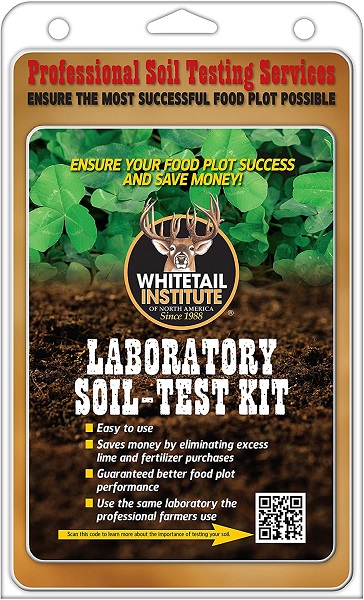
However, what you get is professional and accurate testing that will tell you what’s in your soil, including the levels of phosphorus, calcium, magnesium, and potassium in it.
The testing kit is focused on food plots, so it will tell you if it’s good to grow herbs, vegetables, or fruits on your piece of land.
Aside from the detailed results, which you can receive via mail or e-mail, you can also get on the phone with a consultant who will discuss the results with you as well as fertilizer recommendations.
You don’t need to guess what kinds of fertilizers to use so that you can have a healthy and thriving food plot.
Pros
- Ideal for those looking to grow
- Thorough and detailed results
- Phone consultations are part of the package
Cons
- You will need to fork out some dough for the shipping costs
- Expensive
7. FUNSW Soil pH Test Kit
If you just need to check your soil’s acidity, you can save money with something like FUNSW Soil pH Test Kit. This kit includes 100 test strips.
What’s more, you can get more accurate results as these strips can test anywhere from pH 0 to 14.
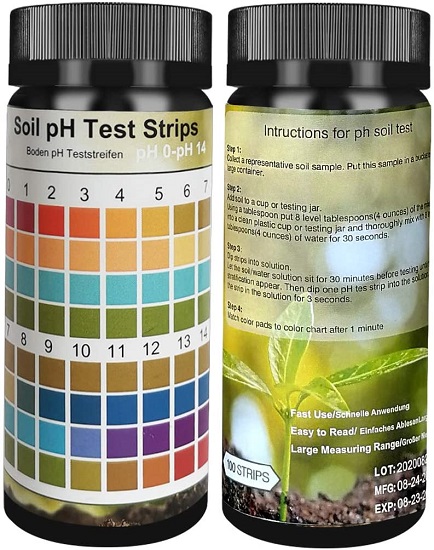
It’s easy to do, as well. After mixing the soil sample with water, you only have to wait until the soil and other sediments settle at the bottom. Dip the strips and check the results after a minute.
Pros
- Affordable
- Ideal for those who only want to test their soil’s pH
- Easy to use
Cons
- Limited to the acidity level of your soil
Frequently Asked Questions
In this section, we collected the most asked questions from our readers and answered them.
Answer: Because your plant’s health and survival depend mainly on the soil you use, your soil test kit must be accurate. According to a 2007 study, commercially available at-home kits had an accuracy rate ranging from 33 percent to 94 percent.
The wide range can put these kits right at either very accurate at more than nine out of then 10 times or a hit or miss getting it right at just one in three tests. Furthermore, different test kits were accurate in specific nutrients, i.e., some were very accurate in measuring nitrates and nitrogen; others were more accurate in measuring potassium or phosphate in the soil.
As you can see, soil test kits might not be as accurate as you would like. this product might be a good idea if you have not tested your soil in the past, but you will want to send the sample to a laboratory any time soon.
Answer: As a general rule, the soil has everything your plant needs to survive. Most of the time, these nutrients are enough. There are fourteen essential nutrients that plants need to thrive, but nitrogen, potassium, and phosphorus are the ones that are used by plants in larger amounts.
Nitrogen, phosphorus, and potassium are called macronutrients, and for the most part, these are the nutrients that are usually depleted in soil. This focus is also the reason why most fertilizers promise to ply the earth with these three nutrients.
Aside from these, three other macronutrients include calcium, magnesium, and sulfur. Your plants also need trace amounts of micronutrients:
• Manganese
• Boron
• Copper
• Iron
• Zinc
• Nickel
• Molybdenum
• Chlorine
Your soil plays an essential part in the health of your plants. They hold the nutrients that these plants need to grow.
Testing your soil will help you ensure that your plants have the nutrients they need. If you discover that your soil lacks nitrogen, you can buy a fertilizer that plies it with the required nutrients.
What’s more, you no longer have to spend money on fertilizers you don’t need. On top of the savings, you can also save the plants from being overly fertilized. Too much fertilizer will cause your plants to grow erratically and maybe even suffer from fertilizer burns.
Testing your soil will also help you diagnose why your plants are wilting or dying. It might perhaps tell you that a deficiency in one of the essential nutrients is preventing your roses from blooming.
pH: Acidic or Alkaline Soil
Plants also don’t like alkaline or too acidic soil. For the most part, most plants grow best in slightly acidic soil. A soil testing kit can tell you if you’re working with soil that’s too acidic or too alkaline.
Similarly, some plants crave very acidic soil, while others like alkaline soil. Knowing your soil’s pH levels will help you see if you need to amend the soil before planting.
Answer: This is because there are a lot of things that you should test with your soil. Some soil testing kits measure the level of nutrients in your soil, while others test for your soil’s pH levels. There are also soil testers that check on your soil’s environmental conditions, including sunlight intensity and moisture.
The latter type of soil tester can tell you whether to move your plants somewhere with more light or shade. It can also tell you when to water your plants.
On the other hand, soil testers that measure the levels of nutrients that your soil has have different ways to do just that. For example, chemical testing kits require you to put a sample of your soil and some water into tubes and then add a chemical to the solution.
These kits usually change in color, and that will tell you whether you will need to augment your soil with that particular nutrient or not.
Some kits require you to send the samples to an actual laboratory
Soil Testing Kits Are Required for Successful Gardening
Knowing what’s in your soil and what conditions it is in will help you grow healthy and thriving plants. It will also help you see what types of plants will survive on that soil. It can also help diagnose problems such as bad fruits, root rot, or knowing which fertilizers to buy.
Thankfully, there are commercial test kits that are very accurate and can tell you everything you need about the nutrients found in the soil, as well as its level of acidity. If you want something more affordable and one that you can do at home, there are options for that as well.
The best soil testing kits out there not only allows you to know the soil you’re working with, but they are also straightforward to use, and the payoff is tremendous. You no longer have to work blindly and hope that plants grow on your land.

